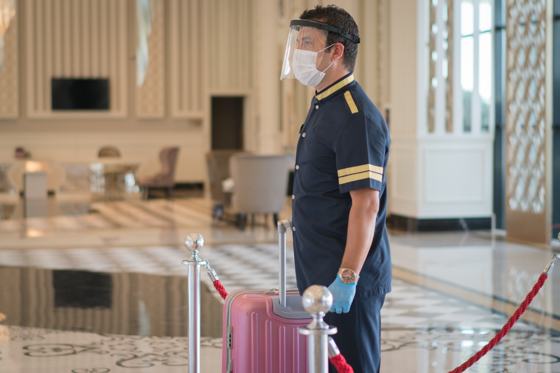Last year the hospitality industry was rattled to its core due to the onset of the COVID-19 pandemic and the resulting government initiatives that limited travel, social gatherings and business operations.
Contributed by David Rothfeld, partner and Joseph Tangredi, associate, Ellenoff Grossman & Schole, LLP, New York City
With a new year underway and the distribution of COVID-19 vaccines, hotels will be looking to reestablish their businesses while keeping a cautious eye on any COVID-19 related developments that may arise. To that end, hotels should expect to have to focus on the following items in 2021.
Continuation of enhanced cleaning
Although cleanliness has always been a priority for hoteliers and their guests, the pandemic has shown that more must be done for everyone in the industry to feel comfortable while traveling.
Many of the cleaning procedures that hotels implemented over the past year will continue. The U.S. Center for Disease Control (CDC) has promulgated cleaning recommendations such as using Environmental Protection Agency approved disinfectants, cleaning surfaces with soap and water, establishing regular cleaning schedules, and educating employees on appropriate cleaning methods.
These steps will be a mainstay in hotels as the American Hotel & Lodging Association adopted many of the CDC’s recommendations. Hoteliers and their employees should remain up to date on any guidance published by the CDC and their respective state Departments of Health and continue to educate themselves on best practices.
Safety, precautionary measures
The most apparent aspect of the new normal for hotels is the safety measures that must be taken to protect employees and guests. Hotels must be aware that steps to combating COVID-19 will continue whether because of market competition or government regulation. As to the former, it is foreseeable that “guest safety” will be a marketing tool. As to the latter, government intervention is inevitable.

As recently as January 29, the U.S. Occupational Safety and Health Administration issued new COVID-19 guidance in response to President Biden’s Executive Order on Protecting Worker Health and Safety. While the Guidance recommends best practices, such as training, communication and adoption of measures such as PPE, state and local jurisdictions are more likely to impose standards on employers.
For example, New York State is likely to pass the New York Health and Essential Rights Act (“NY HERO Act”) that will require all employers to implement a policy that is compliant with the New York State Department of Health’s standards on employee health screenings, face coverings, PPE, utilization of hand hygiene stations, cleaning, social distancing, air quality and ventilation, and compliance with orders of quarantine or isolation. Further, the NY HERO Act will provide employees the right to refuse work assignments in certain circumstances.
Accordingly, hoteliers should continue to enforce their policies and educate their employees on how to appropriately and effectively work while complying with all safety measures.
Technological changes
The pandemic left many businesses scrambling to find the newest and best technology available to provide the safest environment for their employees and guests. Technology that was once outside the mainstream, or nascent, will now become norms in many workplaces.
One common theme is the implementation of fully automated/touch-free check-in processes via smart phone applications. Hotels are also examining the adoption of virtual food and beverage menus accessible via QR codes.Additionally, the use of machines or “robot cleaners,” which utilize UV light or disinfectant chemicals, are under active consideration.
The proliferation of technological advances confronts hoteliers with the dilemma of balancing cherished principles of personalized service with enhanced safety and reduced labor expense. Unionized hotels must recognize obligations that exist under a collective bargaining agreement and federal labor law regarding the introduction of new technology and the concomitant changes in, or elimination, of jobs.
Amenities
The pandemic has taught us to be cautious when touching objects that are frequently touched and congregating with others in confined areas. Such caution will inevitably continue to be applied when it comes to hotels’ selection and maintenance of amenities.
At the outset of 2021, hotels will inevitably have to continue their reduction of in-room amenities, such as pens, cups, magazines, ancillary furniture, but will also keep a keen eye on restoring amenities as COVID-19 abates.
A minimalist approach to guest room decoration reduces the number of high touch surfaces and objects and makes cleaning and maintenance of such areas easier and less time consuming. Such an approach to amenities in public space areas, gyms, spas and pools will also likely continue into 2021.
Food and beverage
Food and beverage was perhaps hit hardest by COVID-19 with the public and communal nature of food and beverage standing in seemingly direct contravention to COVID’s transmissibility features. As 2021 advances with a vaccine-produced herd immunity and perhaps greater adherence to mask wearing, it is anticipated that food and beverage will see an upswing.
The question is just how high that upswing will be. Certainly, economic devastation over the nearly 12 months of the pandemic, with the hope of a health-based recovery, is forcing U.S. states and local governments to loosen the restrictions on indoor dining. For example, New York State’s Governor Cuomo announced that New York City could resume in-door dining at 25% capacity on February 14 and that banquets and meetings up to 150 attendees could take place effective March 15.
Vaccine policies
The greater availability of a vaccine presents myriad issues for all employers, particularly hospitality employers.
While the Equal Employment Opportunity Commission released guidance indicating that employers are free to require employees to be vaccinated, that opened up a series of other legal questions, such as how are employers to handle requests for accommodations due to claims of disability or religious beliefs and whether requiring an employee to take the vaccine is compensable time under the Fair Labor Standards Act.
Issues with guests, customers and vendors, such as refusing service or seeking a waiver of liability, is equally complicated.
